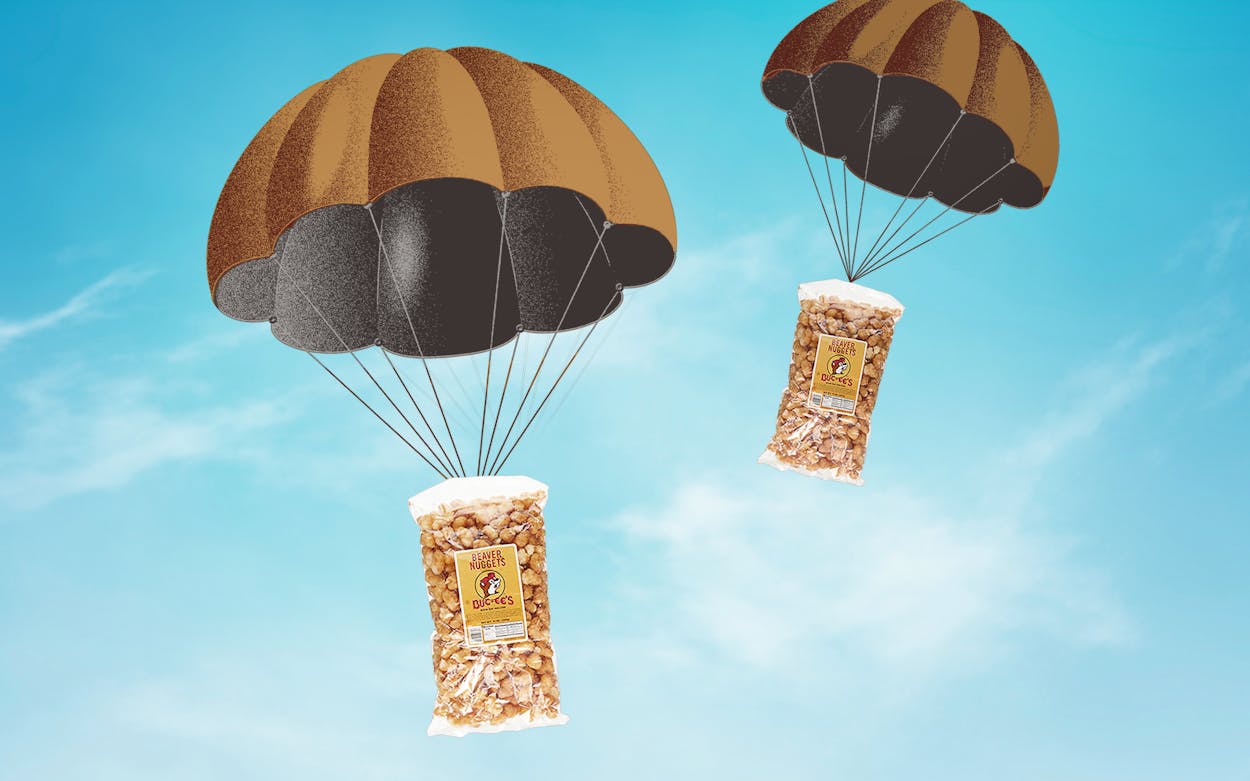What is it about Buc-ee’s that inspires such fierce loyalty? Is it the mascot, that toothy beaver bedecked with a ball cap, a guileless expression on his face as he gazes down upon passing motorists from billboards dotted across Texas? Is it the sheer size of each of the chain’s several dozen locations, some of which sprawl over Walmart-size stretches of middle-of-nowhere along our state’s highways? Is it the bathrooms, sparkling clean and legendarily comfortable for those who need a peaceful place to relieve themselves on a break from speeding down the interstate? Is it mere Texas pride, the compulsion that residents of the Lone Star State feel to evangelize for every brand that originated here, the same way that we romanticize H-E-B, Taco Cabana, and Whataburger?
Or is it the snacks? Do Texans love Buc-ee’s for the infamous Beaver Nuggets, the near-infinite array of conveniently packaged candy nuts, the shockingly robust collection of hot sauces, the endless jerkies? Is that what inspires us to honor the beaver on hats, face masks, and swimwear?
Plano entrepreneur Chris Koerner believes that it is, in fact, the snacks that we love so much about Buc-ee’s. After attempting, with no success, to reach out to Buc-ee’s executives about developing a web platform for them to sell their products online to customers around the country, Koerner opted to take matters into his own hands. This week he launched TexasSnax.com, a sort of bootleg online Buc-ee’s store, where customers who long from afar for their Beaver Nuggets or Chili Limón Pork Rinds can place an order. Koerner—whose e-commerce background includes running the business-to-business platform SendEats.com—will then dart off to the nearest Buc-ee’s, purchase any of its 282 nonperishable products at the full retail price, ship it to the nugget-craver, and gross a slim markup of roughly 20 percent per item. (He says his take is closer to 10 percent after all his expenses are factored in.) TexasSnax is shipping to all fifty U.S. states and dozens of international destinations.
Koerner is aware that this is an unusual proposition, but he believes in it. He was inspired to get into the bootleg Buc-ee’s business by a similar venture, the ill-fated Pirate Joe’s, which resold Trader Joe’s products purchased in Seattle to consumers in Vancouver, British Columbia, where the company has no stores. Though Pirate Joe’s shut down in 2017, after a lawsuit from the company whose products it sold, Koerner believes that being explicit that he’s a reseller, unaffiliated with the Beaver itself, protects him.
“Selling a new product is protected under first-sale doctrine, but if you imitate them, you can get in trouble,” he says. “So we put on every single product [page] that we aren’t Buc-ee’s, we pay what you’d pay at Buc-ee’s, we’re just big fans, and we just resell their products.”
Many businesses rely on first-sale doctrine—it’s what allows a used record store to sell a copy of a Beatles record without first running it by Paul and Ringo—and according to Suffolk University Law School professor Stephen McJohn, who published a paper on the subject in the Texas A&M Law Review earlier this year, Koerner’s interpretation of the law is correct. “As long as someone is selling genuine goods that they own, without any deceptive or confusing element, they would not be infringing trademark,” he tells Texas Monthly. “The idea is, if someone owns a genuine trademarked product, that’s their property and they should be free to resell it.”
Koerner hopes that the site will do enough business that the slim profit margin still helps his company succeed—but he also acknowledges that the project is a kind of backdoor pitch to Buc-ee’s leadership, who he says didn’t respond to his cold calls and emails offering his services.
“It’s kind of a pitch, but it’s also a real business,” he says. “If they were to approach us and want to work together, it’d be like, ‘Let’s shut down TexasSnax.com tomorrow and we can just sell this on your site, and we’ll just charge a little fulfillment fee. I’d much rather this were an official thing.” Koerner cites significant challenges to operating a business on the TexasSnax.com model. “It’s certainly not convenient driving all the way to a Buc-ee’s—no one lives close to a Buc-ee’s, by design, since they’re for road trips,” he says. “It took hours just to find and buy these 282 products. If we were to do this twice a week, I have no idea how much time and logistics that’s going to take. Would they say we can’t buy this much, they need it for other customers? I’m foreseeing a lot of issues.”
So why launch the site at all? Koerner says that as long as the market is there, and Buc-ee’s neither approaches him about a partnership nor sues him out of existence, he’s in it with TexasSnax.com for the long haul, out of love. “I went to Buc-ee’s with my cofounder, my cousin Kirk, when he was visiting,” Koerner says. “I had this idea on the way home, and it was perfect. They have so many unique snacks. If people will pay an extra $4 to get McDonald’s DoorDashed to them, why wouldn’t they pay an extra 20 percent to get these products mailed to them across the country? I just saw it as the perfect opportunity.”
Buc-ee’s, meanwhile, seems content to let Koerner test the waters for the nationwide mail-order snack market. While the company was previously unaware of TexasSnax.com, it has received the concept with the good nature of its mascot, though a Buc-ee’s representative did ask Koerner to change the name from the less savory, and potentially more trademark-infringing “BeaverSnax” earlier this week. “We are glad to see that our prices are so good that customers are willing to pay a premium for direct delivery,” Buc-ee’s general counsel, Jeff Nadalo, wrote in an email to Texas Monthly. “It appears [TexasSnax] has found a niche reselling Buc-ee’s wonderful food, unique children’s toys, and creative apparel.”








